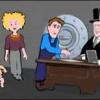| Online: | |
| Visits: | |
| Stories: |
Scientists Capture The Sound Of A Single Atom, And Apparently It’s A ‘D-Note’
What does an atom sound like? Apparently it’s a “D-note.”
That’s according to scientists at Chalmers University of Technology in Göteborg, Sweden, who have revealed in a new study that they’ve captured the sound of a single atom.
“We have opened a new door into the quantum world by talking and listening to atoms,” study co-author Per Delsing, a physics professor at the university, said in a written statement. “Our long term goal is to harness quantum physics so that we can benefit from its laws, for example in extremely fast computers.”
For their study, Delsing and his colleagues constructed an artificial atom 0.01 millimeters long and placed it on the end of a superconducting material. Then they guided sound waves along the surface of the material, bounced sound off of the atom, and recorded what came back using a tiny microphone located on the other end of the material.
“According to the theory, the sound from the atom is divided into quantum particles,” study co-author Martin Gustafsson, a post-doctoral researcher at Columbia University, said in the statement. “Such a particle is the weakest sound that can be detected.”
That sound was a “D-note” about 20 octaves above the highest note on the piano, which is a pitch much higher than the human ear can detect.
The researchers said that manipulating sound on the quantum level may lead to new developments in quantum computing. Sound has a short wavelength and travels 100,000 times slower than light, which means it’s much easier to control.
“Whether it has implications for quantum computing may be too early to tell, but it expands the toolbox for technologies to work with,” Steve Rolston, co-director of the University of Maryland’s Joint Quantum Institute, who was not involved in the study, told Discovery News.
Source: http://www.ascensionearth2012.org/2014/09/scientists-capture-sound-of-single-atom.html





